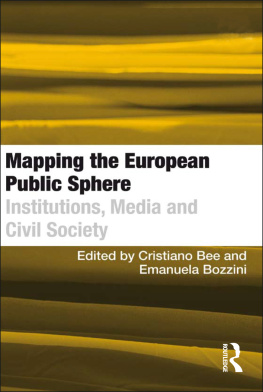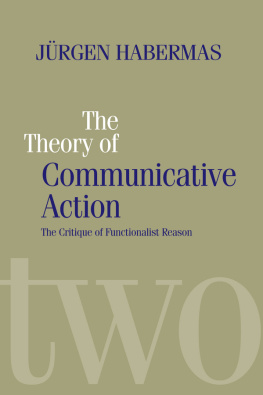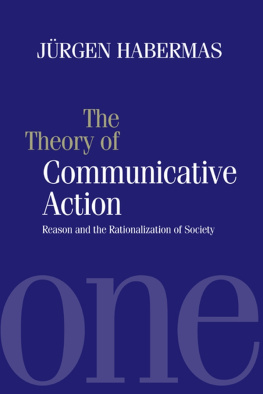
The Communicative Construction of Reality
This volume advocates a shift from the social constructivism found in the work of Thomas Luckmann and Peter Berger, to a communicative constructivism that acknowledges communication as an embodied form of action in its own right, according to which social actors, in engaging in communicative action, construct a material social reality that guides, delimits, and enables actions. A study of the importance of understanding the role of communication in an age in which digitization and mediatization have extended the reach of communication to a global level and brought about the emergence of the communication society, The Communicative Construction of Reality shows how communication society does not merely replace modern society and its hierarchical institutions, but complements it in a manner that continually results in conflicts leading to the refiguration of society. As such, it will appeal to scholars of sociology with interests in the sociology of knowledge, communication, and social theory.
Hubert Knoblauch is Professor of Sociology at Technische Universitt Berlin, Germany. He is the author of Powerpoint, Communication, and the Knowledge Society ; the co-author of Videography: Introduction to Interpretive Videoanalysis of Social Situations ; and the co-editor of Culture, Communication, and Creativity: Reframing the Relations of Media, Knowledge, and Innovation in Society , and Social Constructivism as Paradigm: The Legacy of The Social Construction of Reality .
Knowledge, Communication and Society
Series Editors:
Bernt Schnettler
Universitt Bayreuth, Germany
Hubert Knoblauch
Technische Universitt Berlin, Germany
Michaela Pfadenhauer
University of Vienna, Austria
Alejandro Baer
University of Minnesota, USA
Knowledge, Communication, and Society: Contributions to the New Sociology of Knowledge seeks to revive the academic collaboration and debates between European and Anglo-Saxon currents of thought in the social sciences that characterized the middle of the last century, and provide a forum for the development of a new sociology of knowledge. A space for transatlantic discussion, it includes original works and translations of central works by contemporary European social scientists and is committed to an empirically grounded program of developing social theory.
Titles in this series
Social Constructivism as Paradigm?
The Legacy of The Social Construction of Reality
Edited by Michaela Pfadenhauer and Hubert Knoblauch
Erving Goffman
From the Perspective of the New Sociology of Knowledge
Jrgen Raab
The Communicative Construction of Reality
Hubert Knoblauch
For more information about this series, please visit:
https://www.routledge.com/sociology/series/KCS
The Communicative Construction of Reality
Hubert Knoblauch
First published 2020
by Routledge
2 Park Square, Milton Park, Abingdon, Oxon OX14 4RN
and by Routledge
52 Vanderbilt Avenue, New York, NY 10017
Routledge is an imprint of the Taylor & Francis Group, an informa business
2020 Hubert Knoblauch
The right of Hubert Knoblauch to be identified as author of this work has been asserted by him in accordance with sections 77 and 78 of the Copyright, Designs and Patents Act 1988.
All rights reserved. No part of this book may be reprinted or reproduced or utilised in any form or by any electronic, mechanical, or other means, now known or hereafter invented, including photocopying and recording, or in any information storage or retrieval system, without permission in writing from the publishers.
Trademark notice : Product or corporate names may be trademarks or registered trademarks, and are used only for identification and explanation without intent to infringe.
British Library Cataloguing-in-Publication Data
A catalogue record for this book is available from the British Library
Library of Congress Cataloging-in-Publication Data
Names: Knoblauch, Hubert, author.
Title: The communicative construction of reality / Hubert Knoblauch.
Description: Milton Park, Abingdon, Oxon; New York, NY: Routledge, 2020. |Series: Knowledge, communication and society |
Includes bibliographical references and index.
Identifiers: LCCN 2019043308 (print) | LCCN 2019043309 (ebook) | ISBN 9781138364653 (hardback) | ISBN 9780429431227 (ebook) Subjects: LCSH: Social constructionism. | CommunicationSocial aspects. | Knowledge, Sociology of. Classification: LCC HM1093 .K66 2020 (print) | LCC HM1093 (ebook) | DDC 302.2dc23
LC record available at https://lccn.loc.gov/2019043308
LC ebook record available at https://lccn.loc.gov/2019043309
ISBN: 978-1-138-36465-3 (hbk)
ISBN: 978-0-429-43122-7 (ebk)
Typeset in Times New Roman
by Deanta Global Publishing Services, Chennai, India
Contents
Types of action, validity claims, and worlds in Habermas theory |
Triadic relation of communicative action |
Course of argument |
Continuation of communicative action according to Habermas/Luhmann |
Chiasmus of motive chain (following Husserl) |
Structures, forms, and communicative action |
Culture and structures (of communicative action) |
Media, signs, and communicative action |
Sociality is the capacity of being several things at once
G.H. Mead, The Philosophy of the Present
More than 20 years ago I wrote a book about the Culture of Communication that was subtitled The Communicative Construction of Cultural Contexts . When I chose the title for this book, The Communicative Construction of Reality , I by no means intended a mere continuation, removal, or revision of this older text. Just as I tried in the first book to develop some theoretical concepts from selected empirical studies and integrate them into a basic theoretical framework, so too is this new book preceded by a wide range of empirical studies on topics ranging from religion and science, through PowerPoint presentations, to death visions and corpses. However, these studies, conducted over the past two decades, are not explored in this book. This is not an empirical study but a purely theoretical book. The focus on theory is, of course, related to empirical studies, and concerns the fact that the arsenal of theoretical notions available seemed to me less and less adequate for empirical research. I therefore began to develop a theory because I was no longer satisfied with the current state of the theoretical discussion in sociology, or, for that matter, in the social sciences in general. As much as my own theoretical background seemed in need of further development, so too did other more recent propositions appear to me to be both unsatisfactory and redundant. Moreover, I felt that theory also needed to take into account the social changes that have occurred since the turn of the 1990s. In particular, communication, the central subject of this book, has changed. The digital age was making its first steps at that time in 1990, I sent my first attachment from a Unix workstation so communication has changed dramatically since, transforming society and social reality.








